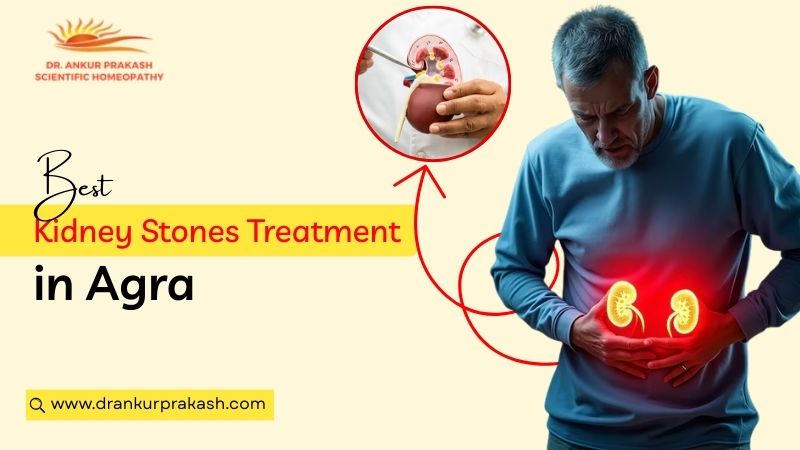Homeopathic Treatment for Kidney Stone
Homeopathic treatment for kidney stones offer a natural and non-invasive solution for those seeking relief from this painful condition. Unlike conventional methods, homeopathic treatment for renal calculi focuses on the individual’s unique symptoms and constitution, aiming to dissolve the stones and prevent their recurrence.
Homeopathy, founded on the principle of ‘like cures like,’ uses highly diluted substances to trigger the body’s self-healing response. In the case of kidney stones, homeopathic remedies are selected based on the patient’s specific symptoms and overall health profile. This personalized approach helps in addressing the root cause of the problem, reducing the likelihood of stone formation in the future.
Understanding Kidney Stones
Kidney stones are hard mineral and salt deposits that form in the kidneys. They can cause severe pain, urinary problems, and sometimes infections. Stones form when urine becomes concentrated, allowing minerals to crystallize and stick together. Depending on their size, they may pass through the urinary tract on their own or require medical intervention.
Types of Kidney Stones
Calcium Stones: The most common type of renal calculi, often formed as calcium oxalate, due to high oxalate levels in urine or less frequent urination.
Uric Acid Stones: These renal calculi develop when urine is consistently acidic, often in individuals with a high-protein diet, diabetes, or metabolic disorders.
Struvite Stones: Typically forming after kidney infections, these stones grow quickly and can become large, sometimes with few symptoms.
Cystine Stones: Resulting from a hereditary disorder called cystinuria, these rare kidney stones form due to the accumulation of the amino acid cystine in the urine.
Calcium Phosphate Stones: Less common than calcium oxalate stones, they occur in alkaline urine and may be associated with certain metabolic conditions.
Causes of Kidney Stone
Dehydration: Insufficient water intake leads to concentrated urine, increasing the risk of renal calculi forming as minerals and salts can more easily crystallize.
Dietary Factors: High consumption of salt, sugar, and protein, particularly from animal sources, can contribute to the formation of renal calculistones by increasing the amount of certain minerals in the urine.
Obesity: Higher body mass index (BMI) is linked to an increased risk of developing kidney stones, possibly due to changes in urine composition and metabolic factors.
Medical Conditions: Certain conditions, such as hyperparathyroidism, urinary tract infections, and renal tubular acidosis, can lead to an increased risk of kidney stones.
Genetic Predisposition: A family history of renal calculi increases the likelihood of developing them, indicating a genetic component to the condition.
Certain Medications: Long-term use of certain medications, such as diuretics, calcium-based antacids, and some anti-seizure drugs, can increase the risk of forming kidney stones.
Sign of Kidney Stone
Severe pain in the back, belly, or side: Intense discomfort typically felt in the lower back or abdomen due to Nephrolithiasis movement.
Pain during urination: Discomfort or sharp pain experienced while passing urine, often due to irritation caused bystones.
Urgent need to urinate: Sudden and strong urge to urinate, commonly associated with renal calculi irritation.
Frequent urination: Increased frequency of urination, which can occur as a response to renal calculus-related discomfort.
Blood in the urine (red, pink, or brown urine): Presence of blood in the urine, varying in color from red to brown, indicating potential urolithiasis damage to the urinary tract.
Cloudy or foul-smelling urine: Urine that appears cloudy or has an unpleasant odor, often indicating infection or Nephrolithiasis stone-related complications.
Nausea and vomiting: Feelings of nausea accompanied by vomiting, which can occur due to severe pain or complications from Nephrolithiasis stones.
Fever and chills if an infection is present: Elevated body temperature along with chills, signaling a possible infection linked to renal calculi.
5 Best Homeopathic Medicine for Kidney Stone
Berberis Vulgaris: Known for its effectiveness in treating the symptoms of Nephrolithiasis , Berberis Vulgaris is often recommended for sharp, shooting pains in the kidney area that radiate to the bladder. It is particularly useful when the pain is accompanied by a sensation of urine retention or when small stones or gravel are passed.
Hydrangea Arborescens: This medicine is used for Nephrolithiasis with accompanying symptoms like white or yellow sediment in urine, burning during urination, and frequent urges to urinate. Hydrangea Arborescens helps in relieving the pain and aiding the smooth passage of urolithiasis.
Lycopodium Clavatum: Suitable for renal calculi on the right side, Lycopodium Clavatum is often chosen for patients who experience severe back pain before urinating, which gets better after passing urine. It also helps in cases where the kidney stones are accompanied by gastric issues.
Cantharis Vesicatoria: Recommended for intense and burning pains during urination, Cantharis Vesicatoria is effective in treating renal calculuss when there are symptoms of urinary tract infections, such as frequent, painful urination and the presence of blood in urine.
Nux Vomica: Best suited for renal calculi issues related to lifestyle factors like sedentary habits, alcohol consumption, or high-protein diets. Nux Vomica can help relieve the frequent urge to urinate, especially at night, and is effective in managing the pain associated with renal calculi.
Disclaimer:
This list is for informational purposes only. Consult with a healthcare professional before taking any homeopathic medicine for kidney stones.
Homeopathic Medicine for Renal Stone
Homeopathic medicine for renal stone helps manage kidney stones naturally by reducing pain, supporting stone dissolution, and improving urinary flow. This approach focuses on correcting metabolic imbalance and may also support overall kidney health, making it useful alongside homeopathy for kidney failure under expert guidance.
Common medicine for renal stone include:
Berberis Vulgaris – Helpful for sharp pain radiating from kidneys to bladder.
Cantharis – Used when there is burning urination with stone discomfort.
Lycopodium – Beneficial for right-sided stones with digestive issues.
Always consult a qualified homeopathic doctor for personalized treatment.
Why is DR. Ankur Prakash Best for Kidney Stone Treatment?
Dr. Ankur Prakash is renowned for his exceptional approach to treating renal calculi, making him one of the best choices for patients seeking effective and natural remedies. Here are the reasons why he stands out:
Natural Treatment: Dr. Ankur Prakash prioritizes a holistic approach to health, emphasizing natural treatments that not only target the symptoms of Nephrolithiasis but also address the underlying causes. His use of homeopathic medicines, which are known for their minimal side effects, ensures a gentle yet effective treatment process, helping patients to avoid the harsher effects of conventional medicine.
Quick Results: Patients of Dr. Ankur Prakash often report rapid relief from their symptoms. His specialized treatment plans are tailored to individual needs, ensuring that patients experience quick results. The effectiveness of his treatments in facilitating the smooth passage of kidney stones and reducing pain has been well-documented in his numerous successful case studies.
Best Homeopathy Doctor in India: With a reputation as one of the best homeopathy doctors in India, Dr. Ankur Prakash’s expertise in homeopathic medicine is unparalleled. His in-depth knowledge, extensive experience, and successful track record in treating renal calculi have earned him nationwide recognition. Patients from all over the country seek his consultation for their renal calculi issues, trusting in his proven ability to heal and provide relief.
In conclusion
Homeopathic treatment for kidney stones offers a personalized and gentle approach, providing a significant alternative to traditional medical interventions. By targeting the individual’s specific symptoms and underlying health issues, homeopathy not only aims to dissolve existing stones but also works to prevent future occurrences. This method, grounded in the natural and holistic principles of homeopathy, stands as a testament to the power of individualized care in overcoming the challenges of renal calculi discomfort.








